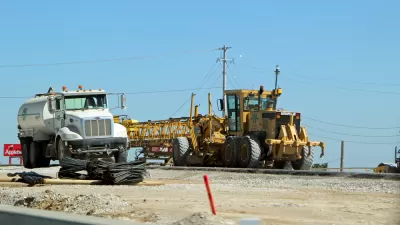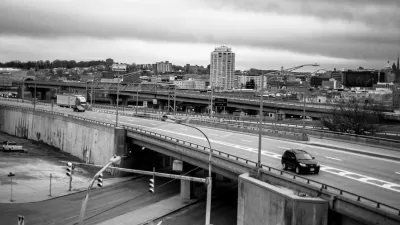The report indicates that large formula funding programs tend to support the status quo, reinforcing car-centric planning and inequitable spending patterns.

A new report from the Urban Institute assesses the gap between the equity goals of the Biden administration and the way federal funds from the Infrastructure Investment and Jobs Act (IIJA) and other infrastructure programs are being distributed, writes Jared Brey in Governing.
“While the term ‘equity’ is used in lots of ways, a key question for infrastructure funding is whether it reaches places that need it the most. That requires understanding inequitable patterns of spending in the past, which helped create racial and class inequities in access to clean water, fast Internet, safe transportation options and affordable housing,” Brey explains.
“The researchers found that formula funding programs, which provide the lion’s share of transportation funding to states, are likely to reinforce existing patterns: Most transit funding, for example, goes to places that already have more transit service, rather than to car-centric places with few alternative travel modes. Competitive grants are often more targeted to areas with higher shares of people of color, the report found.” The report suggests reforming some of the major federal formula funding programs that are out of step with today’s funding needs.
Unsurprisingly, “communities with less government staff capacity to apply for grants are substantially less likely to receive funding,” signaling a need for more resources devoted to helping underresourced local governments apply for grants. “The federal government should play a role in supporting local governments with low staff capacity, the report says.”
FULL STORY: Measuring Equity in Federal Infrastructure Spending

Alabama: Trump Terminates Settlements for Black Communities Harmed By Raw Sewage
Trump deemed the landmark civil rights agreement “illegal DEI and environmental justice policy.”

Study: Maui’s Plan to Convert Vacation Rentals to Long-Term Housing Could Cause Nearly $1 Billion Economic Loss
The plan would reduce visitor accommodation by 25% resulting in 1,900 jobs lost.

Planetizen Federal Action Tracker
A weekly monitor of how Trump’s orders and actions are impacting planners and planning in America.

Federal Homelessness Agency Places Entire Staff on Leave
The U.S. Interagency Council on Homelessness is the only federal agency dedicated to preventing and ending homelessness.

Restoring Northern India’s Himalayan ‘Water Temples’
Thousands of centuries-old buildings protect the region’s natural springs and serve as community wells and gathering places.

Milwaukee to Double Bike Share Stations
Bublr Bikes, one of the nation’s most successful, will add 500 new e-bikes to its system.
Urban Design for Planners 1: Software Tools
This six-course series explores essential urban design concepts using open source software and equips planners with the tools they need to participate fully in the urban design process.
Planning for Universal Design
Learn the tools for implementing Universal Design in planning regulations.
Caltrans
Smith Gee Studio
Institute for Housing and Urban Development Studies (IHS)
City of Grandview
Harvard GSD Executive Education
Toledo-Lucas County Plan Commissions
Salt Lake City
NYU Wagner Graduate School of Public Service





























